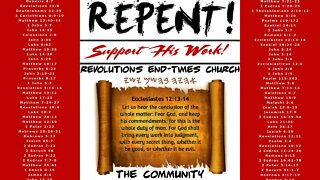Amos 1-4 | Painful Judgements
The book begins with a series of prophecies against surrounding nations, highlighting their sins of injustice and corruption. Through divine judgment, God confronts Moab's transgressions, Judah's violations of the covenant, and the oppressions committed by other nations. These condemnations serve as a warning that no nation is exempt from God's scrutiny.
In chapter 2, Amos turns his attention to Judah and Israel, addressing their specific sins. He denounces their idolatry, mistreatment of the poor, and their failure to uphold the covenant. Amos warns that divine retribution awaits them if they do not repent and return to God.
Emphasizing Israel's privileged position, Amos highlights their accountability to God in chapter 3. As the chosen people, they have a responsibility to live according to His commandments. Through divine communication, God warns Israel of the impending judgment for their spiritual corruption and lack of faithfulness. This chapter underscores the importance of divine justice and the consequences of disregarding God's commands.
In chapter 4, Israel's false worship and empty rituals are exposed by Amos. Despite experiencing divine discipline through locust plagues and droughts, Israel remains unrepentant. Amos calls upon them to recognize the futility of their rituals and to genuinely repent. Divine discipline serves as a wake-up call for Israel to return to God, forsaking their superficial religious practices.
In chapter 5, Amos urges Israel to seek God and pursue justice. He emphasizes the necessity of genuine worship and a transformed heart. Amos warns of the impending judgment if they persist in their wickedness, urging them to turn away from evil and embrace righteousness. The chapter emphasizes the urgency of aligning their actions with their faith and embracing justice as an integral part of their worship.
Throughout Amos 1-5, the prophet's messages address a wide range of issues, including divine judgment, the call for repentance, idolatry, injustice, and the need for true worship. These chapters serve as a warning to Israel and the neighboring nations, urging them to examine their actions and return to God before it's too late.
Amos, although written centuries ago, holds relevance for the Church today, offering valuable insights and lessons. The book addresses moral and social issues prevalent in society, reminding us of the importance of justice, righteousness, and genuine worship.
Amos 1-5 highlights the dangers of empty religious rituals and false worship. It serves as a reminder that mere external acts of worship, devoid of inner transformation and genuine faith, are insufficient. The Church today can reflect on this message by examining the authenticity of its worship practices, ensuring that they are rooted in a sincere and deep connection with God.
-
 23:00
23:00
Gods Plan Your Part
1 year agoJudges 10-12 | Things You Shouldn't Say
7 -
 26:18
26:18
Gods Plan Your Part
1 year agoAmos 6-9 | Luxury, Idolatry, Destruction and Redemption
19 -
 9:32
9:32
Practical Christianity
1 year agoGod's justice and wrath are deeply intertwined
6 -
 0:59
0:59
God's Point of View
1 year agoYou Can't Get Your Wasted Life Back | God's Point of View (Short #15)
-
 9:54
9:54
Thomas McNeilly Please Subscribe
2 years agoJudges 2 the Lord's messenger condemns
10 -
 2:15:15
2:15:15
BiblestudywithDerrick
1 year agoJudges 4 & 5
26 -
 11:25
11:25
Campbellfamily07
4 months ago"Judgment and Humility: Learning from Paul's Wisdom (1 Corinthians 4:1-5)
64 -
 52:20
52:20
CatholicReboot
10 months agoEpisode 1516: Are you judging others?
1861 -
 44:27
44:27
RevolutionsForTomorrow
1 year agoDon't Be Offended. DO WHAT'S RIGHT.
10 -
 58:36
58:36
JosephZLive
1 year agoGOD'S FINAL WARNING!
1.65K10